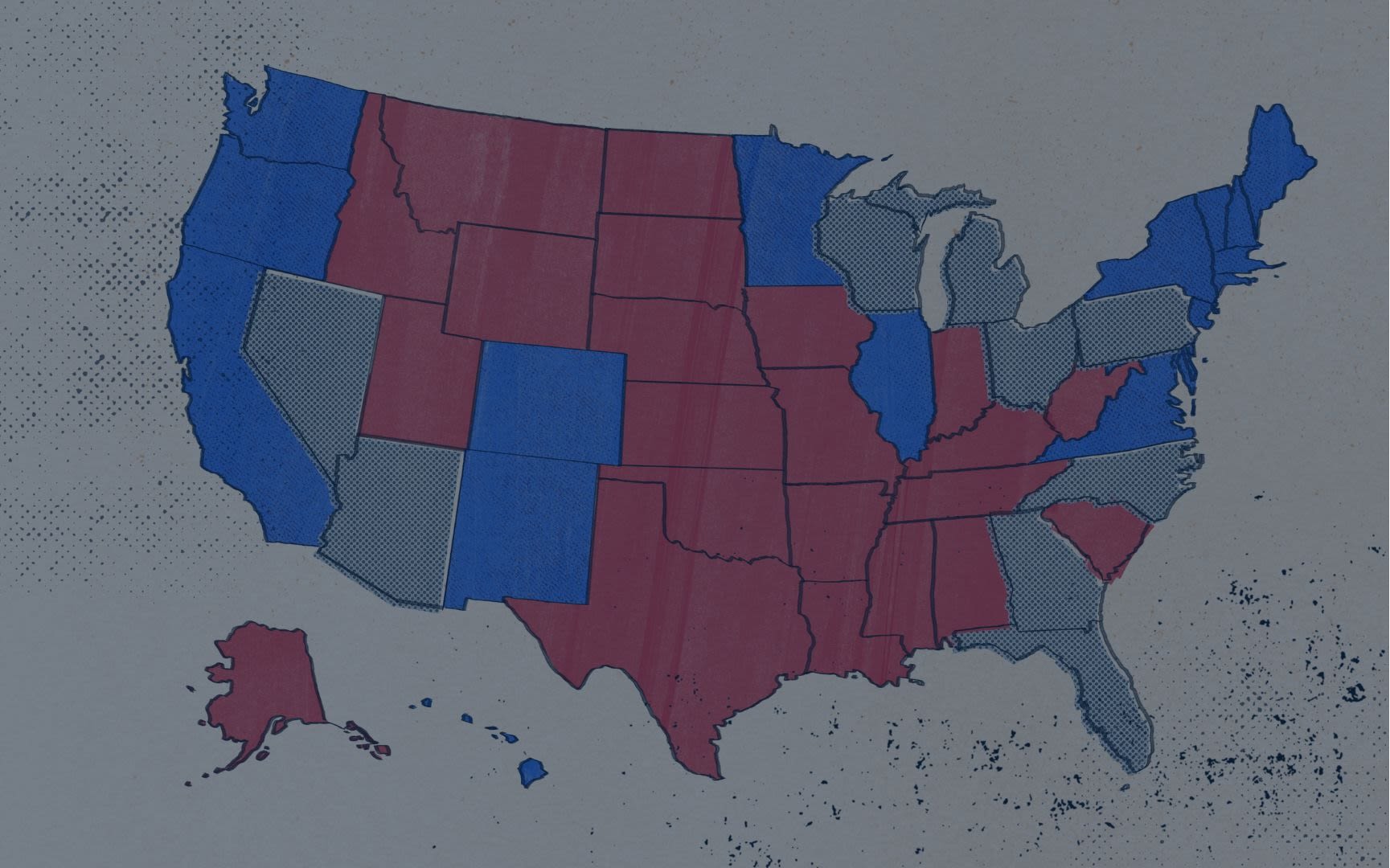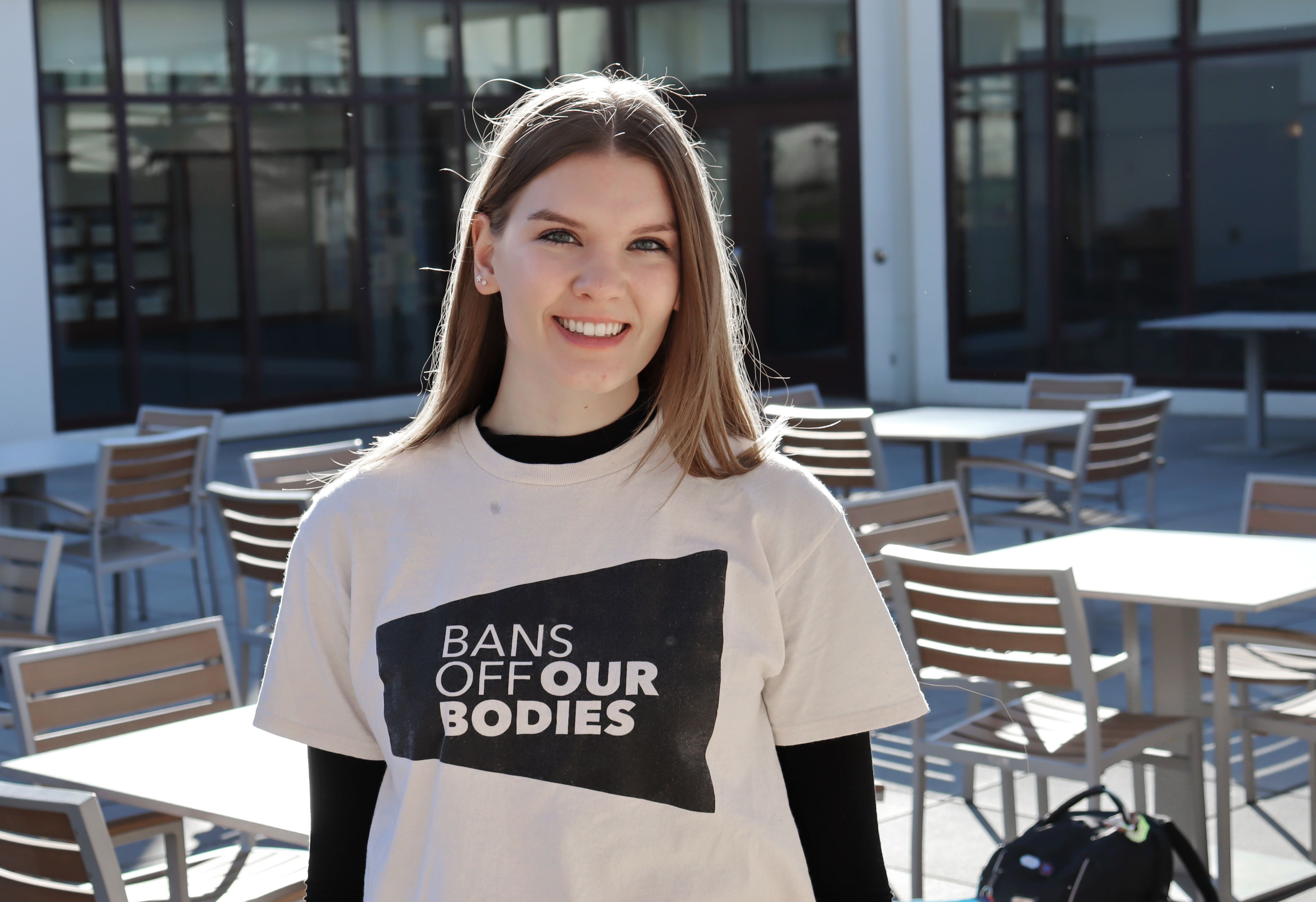The 2024 General Election ends November 5.
More than 30% of DePaul's population is comprised of out-of-state students. Many of them are from swing states.
Swing-state young women, driven by reproductive rights, could decide election

By: Lucia Preziosi, Editor-in-Chief
Jake Cox contributed to this report
A
s Election Day inches closer, Vice President Kamala Harris and former President Donald Trump are in a mad dash to secure voters in battleground states.
Like many universities, DePaul has thousands of out-of-state students; 30% of DePaul’s student body is not from Illinois. Many of these students vote absentee, rather than voting in Chicago.
The DePaulia interviewed six women, ranging from freshman to seniors to speak about their first time voting for president, absentee.
When asked what issues were most important to them in deciding their vote, there was an unanimous answer:
reproductive rights.
The overturning of Roe v Wade had a significant impact on electoral dynamics. More voters than ever say they will only vote for a candidate who shares their views on abortion, according to the New York Times.
Young women have become particularly more left-leaning on this issue, with a Gallup analysis showing much higher proportions of 18-to-29-year-olds who hold a liberal perspective. Kamala Harris even appeared on the popular, women-centered podcast ‘Call Her Daddy’ to speak about reproductive rights.
The women interviewed hail from Ohio, Wisconsin,and Michigan. Despite coming to DePaul from across the country, they all remained adamant about their support for reproductive rights, leading to their support for Harris — despite reservations over the vice president’s stance on the ongoing humanitarian crisis in Gaza.
Despite repeated attempts, The DePaulia was unable to find a female voter on campus who supported Trump. Read about our commitment to fair reporting here.
Meet DePaul’s voters:
Kailey Gielink stands on the rooftop terrace of the DePaul Center on Thursday, Oct. 24, 2024. Originally from Michigan, Gielink mentioned her community’s impact on her decision to pursue law and political advocacy. (Aiko Tai/The DePaulia)
Kailey Gielink stands on the rooftop terrace of the DePaul Center on Thursday, Oct. 24, 2024. Originally from Michigan, Gielink mentioned her community’s impact on her decision to pursue law and political advocacy. (Aiko Tai/The DePaulia)
Kailey Gielink, Suburbs of Cleveland, Ohio
Kailey Gielink is a senior at DePaul. Gielink is originally from Ohio and this is her first time voting absentee for a presidential election.
“Reproductive justice is something I'm extremely passionate about,” Gielink said.
Gielink is involved in DePaul’s Planned Parenthood Generation Action chapter and has a history of working with Catholics for Choice, a group that advocates for reproductive rights through Catholic social thinking.
One of Gielink’s greatest moments of pride in her home state was when Ohio voters chose to codify the right to an abortion in its constitution. The decision reignited her hope in democracy, she said.
“I have never been more proud to be an Ohio voter in my life,” Gielink said. “(The vote) in itself just shows the strength of democracy. … A lot of the time, Ohio politics are usually things you don’t want to be proud of … especially in terms of reproductive rights.”
Even though Ohio’s reputation as a swing state has dwindled in recent election cycles, Gielink still sees an active divide between Democrats and Republicans in the state.
Gielink also listed concerns about education, such as book bans and limits on Advanced Placement courses, and an Ohio state-wide election about gerrymandering as her motivations for voting.
Norah Gelhaus, West Bend, Wisconsin
Norah Gelhaus, a senior, vividly remembers the night Supreme Court Justice Ruth Bader Ginsberg passed away.
Her mother told her at the dinner table on Sept. 18, 2020. She immediately started crying, thinking about the implications of the justice’s death on her right to an abortion.
During her tears, she recounted who surrounded her at the dinner table.
“The other men at the table with me, four other boys, started laughing at me because they didn’t understand the magnitude of what that meant,” Gelhaus said. “At that moment, I really knew that my rights were on the line.”
From that moment on, Gelhaus ruminated about the overturning of Roe v. Wade, until its eventual reversal in 2022.
“It was difficult to see that actually play out, and see Roe v. Wade get overturned,” Gelhaus said.
Trump frequently makes reference to this, saying “I was able to kill Roe v. Wade” in a social media post in May, 2023.
For Gelhaus, her fears about her right to choose stuck with her until her moment to vote via mail-in ballot this election season.
Her support for Kamala Harris was clear from the start. She shared the hope she felt when Joe Biden stepped down over the summer. Casting her vote for Harris was an important task to her, she said.
Gelhaus said her repeated experiences of sexism and other forms of “hateful speech, especially towards women” only reinforced her motivations to cast her vote in Wisconsin, despite residing in Chicago.
“Obviously I want to vote in Wisconsin, where I had to grow up and deal with all of that,” Gelhaus said.
Norah Gelhaus, a public policy student from Wisconsin, stands on the rooftop terrace of the DePaul Center on Thursday, Oct. 24, 2024. Gelhaus described her involvement in affordable public housing efforts with her major. (Aiko Tai/The DePaulia)
Norah Gelhaus, a public policy student from Wisconsin, stands on the rooftop terrace of the DePaul Center on Thursday, Oct. 24, 2024. Gelhaus described her involvement in affordable public housing efforts with her major. (Aiko Tai/The DePaulia)
Aspen Mittler holds her Michigan ballot by the Chicago lakefront on Wednesday, Oct. 23, 2024. Mittler values staying connected to her home state’s election, even while living out of state. (Aiko Tai/The DePaulia)
Aspen Mittler holds her Michigan ballot by the Chicago lakefront on Wednesday, Oct. 23, 2024. Mittler values staying connected to her home state’s election, even while living out of state. (Aiko Tai/The DePaulia)
Aspen Mittler, Marine City, Michigan
Aspen Mittler, a freshman, is from a small town in Michigan, neighboring the Canadian border. She characterized the town as “very conservative.”
“Something really important to me is women’s reproductive rights,” Mittler said. “There’s a lot of propaganda (where I’m from), like ‘don’t get an abortion, you’re killing people.’”
Mittler said the spread of misinformation about abortions in her town further increased the importance she held to reproductive justice in this election.
Michigan has become a swing state in recent elections — former President Donald Trump narrowly won the state in 2016 by fewer than 11,000 votes, and Biden secured the state in 2020.
Mittler said the biggest difference she noticed between voting in Chicago versus voting in her rural hometown is the greater accessibility to polling sites.
“(In Chicago) I saw locations that were within blocks of each other,” Mittler said. “Back home I would have to drive to my township’s office to vote, and that would be the only location where I could go vote in person.”
Mittler expressed that she did extra research this election because it would be her first time voting, and also said her professors at DePaul have been helpful in the process.
Eva Strazek, Lakewood, Ohio
Eva Strazek is a junior from a suburb of Cleveland. This is her first time voting for president, and she is voting by mail.
Strazek explained Ohio’s political landscape, identifying small, concentrated “blue” areas of the state in proximity to cities and sprawling “red” outside of these boundaries, similar to most states' political makeups.
“There’s actually this (idea) called the ‘Five Ohio’s Theory,’ it’s that Ohio is a microcosm of America because it has five very distinct regions,” Strazek said.
Though Strazek identifies “very left of center,” and says though she “would want somebody much more progressive than Kamala Harris,” her fear of another Trump presidency has motivated her to rally behind the vice president.
“I really want us to be able to protect our abortion rights in Ohio,” Strazek said. “I want to keep Trump out of office no matter what.”
Polls show that the right to choose still remains essentially split throughout the state, though voters approved the addition of the right to an abortion in the state’s constitution in 2023.
Eva Strazek, a junior studying dramaturgy/criticism, stands in front of the Schmitt Academic Center on Wednesday, Oct. 23, 2024. Strazek is originally from Cleveland, Ohio. (Aiko Tai/The DePaulia)
Eva Strazek, a junior studying dramaturgy/criticism, stands in front of the Schmitt Academic Center on Wednesday, Oct. 23, 2024. Strazek is originally from Cleveland, Ohio. (Aiko Tai/The DePaulia)
Grace Provan stands in the St. Vincent DePaul Parish courtyard on Wednesday, Oct. 23, 2024. As an out-of-state student from Wisconsin, Provan discussed her education's positive impact on her growing up and her motivation to share that with her students. (Aiko Tai/The DePaulia)
Grace Provan stands in the St. Vincent DePaul Parish courtyard on Wednesday, Oct. 23, 2024. As an out-of-state student from Wisconsin, Provan discussed her education's positive impact on her growing up and her motivation to share that with her students. (Aiko Tai/The DePaulia)
Grace Provan, Delafield, Wisconsin
Grace Provan is a senior from a suburb outside Milwaukee. She says that it is extremely apparent that her home state is a swing state that could play a crucial role in this election.
“It’s like the neighbors are having competitions with each other, who can have the most signs out? ” Provan said. “One neighbor is gonna be like, ‘Trump 2024’ and have all these signs, and then the person immediately next door says ‘how many Harris-Walz signs can we put out?’”
Provan said that she is “very staunchly pro-Palestine,” making it difficult to come to the ultimate decision to cast her vote for Kamala Harris.
“But other issues, I can’t ignore.” Provan said. “Women’s reproductive rights, that’s essential to me. Everyone should have control over their own bodies. Everyone should have access to healthcare. I don’t understand why that’s controversial.”
Provan’s roots in Wisconsin made her wary of casting her vote for a third-party candidate, which many are considering as an opposition to the United States’ continued support of Israel.
But to her, she didn’t have the “privilege” to do so.
“I couldn’t not vote for Kamala, right? Because in a swing state, you don’t really get the privilege to consider a third party candidate,” Provan said.
Provan’s initial hesitations about Harris have not wavered, but she does not see a productive solution in voting for a third-party candidate.
“If I could choose a different candidate who does not support sending more funding to Israel, I would 100% do that. But I can’t in good conscience split the Wisconsin vote between Jill Stein and Kamala Harris,” Provan said.
The changing demographic
In a recent New York Times/Siena national poll, Harris continues a significant lead among young women in the upcoming race.
As Trump gains strength among young men, young women stand firm in their support for Kamala, and for reproductive rights, with polls also showing that abortion is now the top issue for young women.
For women in swing states, like those who go to DePaul, abortion also remains at the top of their list when thinking about their importance in voting in battleground elections.
“Wisconsin is obviously a swing state, so my rights are not secure, especially in Wisconsin,” Gelhaus, the DePaul student from Wisconsin, said. “That’s why I think it’s so important to vote in a swing state, because my vote matters, and my rights are really on the line.”
Web Design: Jake Cox, Map Illustration: Yuyu Blue.








